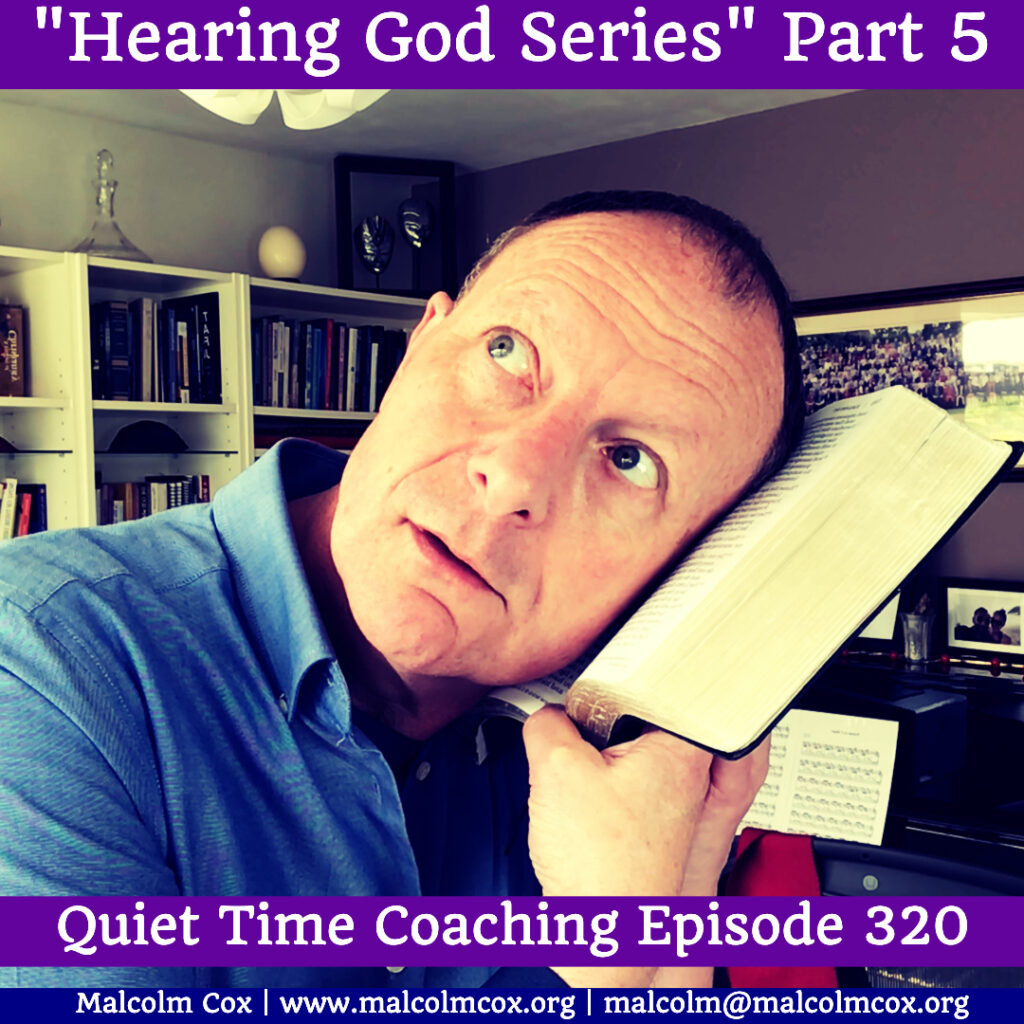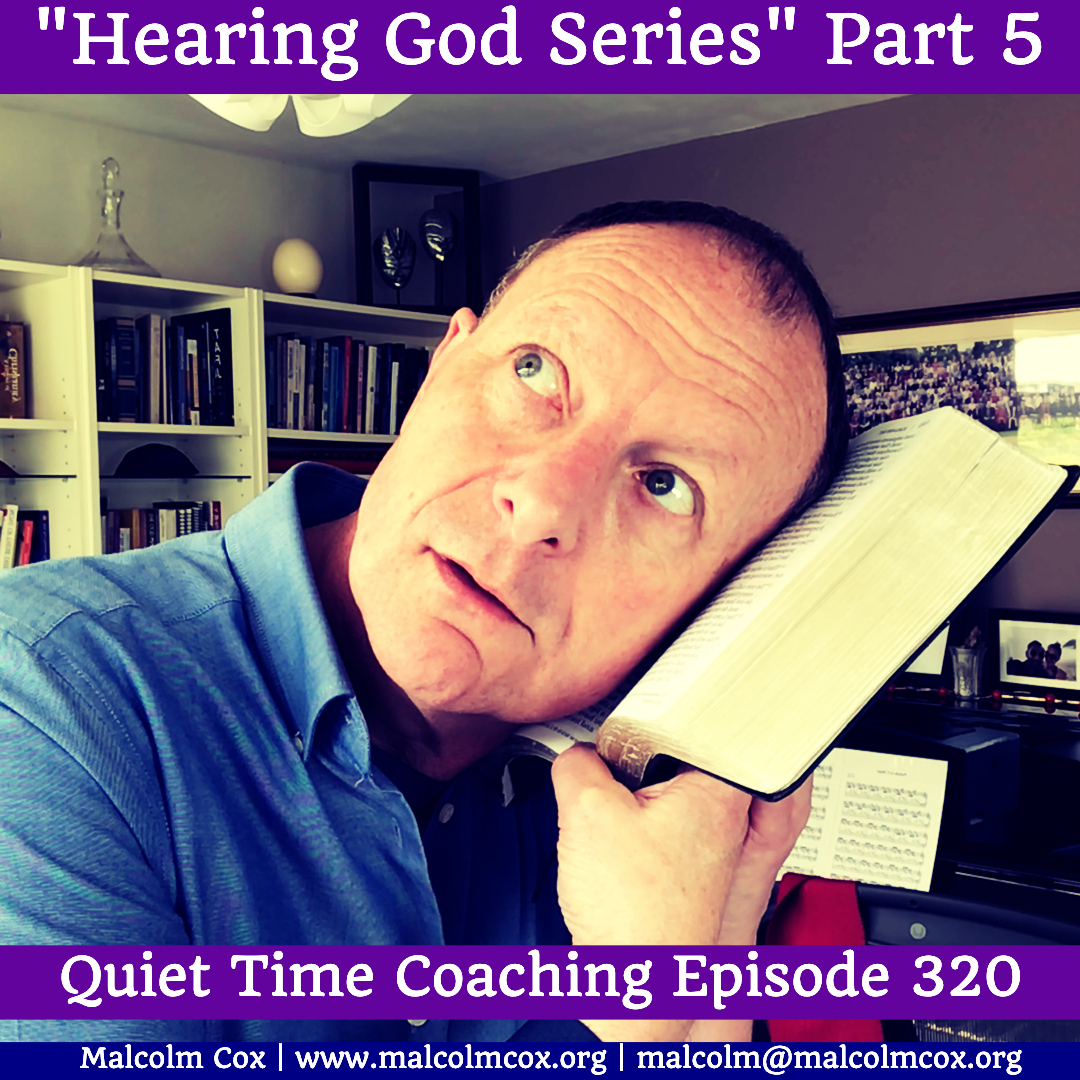Quiet Time Coaching Episode 320

Hearing God: Developing a Conversational Relationship with God; Dallas Willard
Today we look at Chapter 4.
Our communicating Cosmos
How do we know whether the voice we are hearing from God or not?
The limits of signs
Jesus could not be forced into doing ‘religious stunts’. Even something directly done by God does not necessarily convince, Luke 16:31.
““He said to him, ‘If they do not listen to Moses and the Prophets, they will not be convinced even if someone rises from the dead.’ ”” (Luke 16:31 NIV11)
‘If a man (says Jesus) cannot be humane with the Old Testament in his hand and Lazarus on his doorstep, nothing – neither a visitant from the other world nor a revelation of the horrors of hell – will teach him otherwise. Such requests for signs are pure invasions.” Hunter ‘Interpreting the parables’, 84
Necessity of a general understanding of God
Knowing God helps us to recognise his word, but also what is congruent with his nature. This comes about largely through knowing his teachings.
Four negative responses
Truth number one: God would
Not only is God capable, but he is humble. Of course he would speak to us ordinary people. The incarnation of Jesus proves that.
Truth number two: God does
Perhaps we are convinced he doesn’t now because we are not in tune with him. Mark 4:23-24
“If anyone has ears to hear, let them hear.” “Consider carefully what you hear,” he continued. “With the measure you use, it will be measured to you—and even more.” (Mark 4:23–24 NIV11)
Another reason could be that we’re not ready. Ready to listen, ready to obey, change. The Lord’s prayer, for example is about God’s will being done.
We don’t hear his voice because we don’t expect it.
“The voice of God would therefore be an unwelcome intrusion into our plans.” 71
Truth number three: God certainly can
Scientism is sceptical about the ability of God to speak
Some assume that if he exists he is utterly beyond this material world. It looks like it runs without him anyway.
This is to assume God works the way we do, that he is in someway limited to interacting with immateriality.
“Not all of reality involves space.” 74
He is near us, Acts 17:27-28, just not necessarily in the way that we think
“God did this so that they would seek him and perhaps reach out for him and find him, though he is not far from any one of us. ‘For in him we live and move and have our being.’ As some of your own poets have said, ‘We are his offspring.’” (Acts 17:27–28 NIV11)
Archbishop William Temple:
“We do not know what Matter is when we look at Matter alone; only when Spirit dwells in Matter and uses it as a tool do we learn the capacities of Matter. The sensitiveness of eye and ear, the delicacy of the artist’s touch, are achievements which we could never anticipate from the study of the lifeless. So, too, we do not know what Humanity really is, or of what achievements it is capable, until Divinity indwells in it. … We must not form a conception of Humanity and either ask if Christ is Human or insist on reducing Him to the limits of our conception; we must ask, “What is Humanity?” and look at Christ to find the answer. We only know what Matter is when Spirit dwells in it; we only know what Man is when God dwells in him.”
Truth number four: and God should!
I wonder if church leaders like myself do not teach more on this because we’re afraid if every member of our congregation should start to hear from God. Would we be able to control the chaos?!
He asks the question whether we want living stones or dead stones, “you also, like living stones, are being built into a spiritual house to be a holy priesthood,” (1 Peter 2:5 NIV11)
Do you want to be a sheep dog or a Shepherd?
We are called to lead, not control
If we leaders control the flock, it is unlikely they will hear from God. They may think it’s unnecessary and delegate it to us!
“I must ask myself, as a Christian minister, to what extent I, in order to secure enough conformity and support to maintain and enlarge my plans, might be prepared to have people put away their minds and their own individual experiences of guidance and communication with the Lord.” 82
There are risks in a congregation if people learn to listen to God. We may have disagreements. We will need to grow in discernment.
When contemplating whether we’ve heard the voice of God we can consider whether it fits with his word, fits with circumstances, and other people who may know something of the situation.
Next week we will go on to look at chapter 5 of the book which is titled “The still small voice and its rivals”.
Please add your comments on this week’s topic. We learn best when we learn in community.
Do you have a question about teaching the Bible? Is it theological, technical, practical? Send me your questions or suggestions. Here’s the email: [malcolm@malcolmcox.org](mailto:malcolm@malcolmcox.org).
If you’d like a copy of my free eBook on spiritual disciplines, “How God grows His people”, sign up at my website: http://[www.malcolmcox.org](http://www.malcolmcox.org/).
Please pass the link on, subscribe, leave a review.
“Worship the LORD with gladness; come before him with joyful songs.” (Psalms 100:2 NIV11)
God bless, Malcolm

